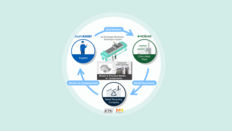- The initiative focuses on recycling rare metals like iridium and ruthenium from end-of-life electrolyzer electrodes.
- The project aims to ensure a stable supply of electrodes for salt electrolysis, reducing dependency on virgin materials.
- The recycling effort supports the EU's 'Critical Raw Material Act' to recycle 25% of strategic raw materials by 2030.
- Future goals include expanding recycling to the water electrolysis field and reducing CO₂ emissions across the supply chain.

Recycling Initiative Overview
Nobian, Asahi Kasei, Furuya Metal, and Mastermelt have launched a project to recycle rare metals from electrolyzers, enhancing circularity in the chlor-alkali industry. This initiative addresses the efficient use of limited precious metal resources by reclaiming and refining metals from end-of-life electrodes.
Importance in the Chlor-Alkali Industry
Electrolyzers in the chlor-alkali industry produce essential chemicals like chlorine, caustic soda, and hydrogen. These processes require rare metals such as iridium and ruthenium for electrodes. Rising demand for batteries and geopolitical factors have increased the costs of these metals, challenging the industry to optimize resource use.
Creating a Circular Value Chain
The project builds on a 2023 pilot in Europe by Nobian and Asahi Kasei, which focused on reusing existing cells. The new initiative targets the recovery of metals from used electrodes, refining them for reuse in new electrodes. This effort aims to stabilize the supply of electrodes and essential chemicals globally.
Future Goals and Industry Impact
The initiative supports the EU's 'Critical Raw Material Act,' which mandates recycling 25% of strategic raw materials by 2030. Future objectives include improving the circularity of the ecosystem, reducing CO₂ emissions by using recycled metals, and expanding into water electrolysis. The collaboration between the companies aims to transform sustainability goals into practical outcomes, ensuring a stable supply of critical raw materials.

